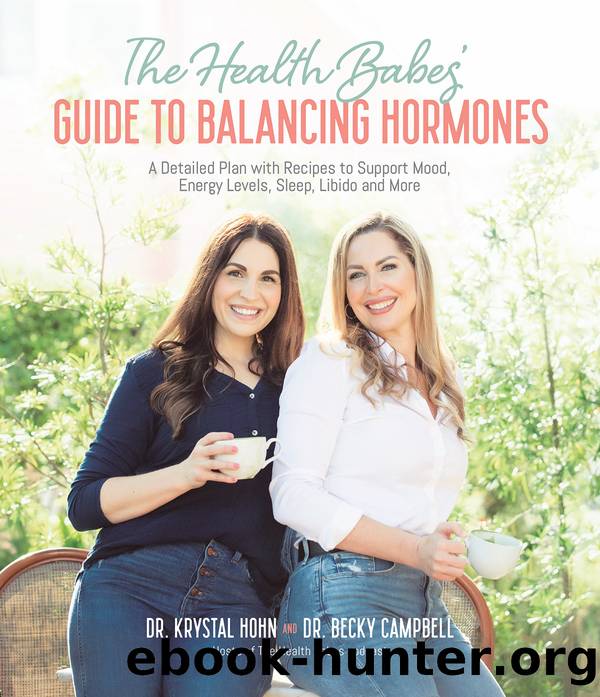The Health Babes' Guide to Balancing Hormones by Dr. Becky Campbell & Becky Campbell

Author:Dr. Becky Campbell & Becky Campbell [Hohn, Krystal & Campbell, Becky]
Language: eng
Format: epub
Publisher: Page Street Publishing
Published: 2022-02-15T00:00:00+00:00
List #1 The Health Babesâ Food Lists
How Often Should I Eat?
Are you a grazer? A meal skipper? Or someone who only eats when theyâre truly ravenous? Believe it or not, your eating schedule can play a big role in hormone regulation, and it can be as important as what you eat when it comes to balance. For each of you, this might look slightly different, and it depends on what your hormones are doing.
Those of you with cortisol or thyroid issues are better off eating regular meals. Skipping meals or fasting for too long can increase the stress effects on the body and result in further dysregulation of these critical hormones. Fasting can still help with weight management, but it is not recommended to go longer than 14 hours without food. Additionally, if you fall into either or both of these two categories, itâs better for you to have something to eat within an hour or two of waking, and to rather close the kitchen earlier in the evening to ensure a 12- to 14-hour overnight fast.98
In those with PCOS and insulin regulation issues, intermittent fasting can be really beneficial. Going without food for an extended overnight period can drastically improve endocrine function and prevent the potential devastating side effects that chronically high insulin may have.99 Research has suggested that a 16:8 fasting to feeding window, which means you fast for 16 hours and eat only in an 8-hour timeframe, can have significant and positive outcomes for cycle regulation, reducing body fat, regulating hormones, lowering insulin levels and managing inflammation.100 With that being said, bio-individuality plays a big role in diet. Not all cases of PCOS are driven by insulin resistance. When PCOS is driven by adrenal gland dysfunction, for example, intermittent fasting may not be the right option. If you find yourself feeling exhausted with fasting, this may be a sign that it is not right for you.
Research also suggests the meal timing we stick to when we do eat is important. For example, grazing on snacks throughout the day may not only interfere with insulin levels, but result in a higher caloric intake than we realize, as well as put more pressure on the digestive system to work. If youâre already struggling with insulin imbalances, weight management issues and less than optimal digestions, eating three meals and one snack across a 12-hour period may be helpful, which for most, would mean eating every 3 to 4 hours.
If youâre not sure about when to eat, the easiest is to go with a 12-hour overnight fast and then have a meal or snack every 3 to 4 hours after that. Adjustments can be made further along the line, once your body gets used to eating nutritious, healthy foods.
Download
This site does not store any files on its server. We only index and link to content provided by other sites. Please contact the content providers to delete copyright contents if any and email us, we'll remove relevant links or contents immediately.
Never by Ken Follett(2880)
The Man Who Died Twice by Richard Osman(2299)
Machine Learning at Scale with H2O by Gregory Keys | David Whiting(2291)
Fairy Tale by Stephen King(2069)
Will by Will Smith(2041)
The Becoming by Nora Roberts(1330)
Friends, Lovers, and the Big Terrible Thing by Matthew Perry(1327)
A Short History of War by Jeremy Black(1300)
Go Tell the Bees That I Am Gone by Diana Gabaldon(1234)
515945210 by Unknown(1207)
443319537 by Unknown(1072)
Works by Richard Wright(1018)
Going There by Katie Couric(991)
The 1619 Project by Unknown(989)
472244821 by Unknown(984)
Living Planet by David Attenborough(897)
264099364 by Unknown(864)
386736962 by Unknown(821)
Bourdain by Laurie Woolever(798)
